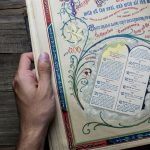It’s humbling to read the sermons and homilies of the church fathers. Grab virtually any passage from Augustine’s Enarrations on the Psalms, and you’ll find a tour de force, as Augustine leads you on a labyrinthine journey from the psalm to Genesis and Exodus to the Gospels to Revelation and back. William Blake trained himself to see the world in every grain of sand; Augustine sees the kaleidoscope of Scripture refracted through every verse.
Augustine isn’t humbling to read because he gets everything right. Some of his twists and turns lead to blind alleys, and he has to back his way out. He’s humbling to read because he’s able to range across the whole Bible without any of the props and crutches we rely on. He didn’t have a written concordance, much less Bible software or a search engine. From the patristic age to the Reformation, Christian teachers roamed freely across the canon because they had stored it in the palace of memory.
It’s probably too much to hope we can replicate their knowledge of Scripture. But is there a way to approximate it? Perhaps, if we grasp and practice four axioms.
1. Trust the Text
What I really mean is: trust the Author. At bottom, that means believing this book is God’s speech in human language. These words are God’s words. If you don’t believe that, nothing else I say will make much sense.
Trusting the text also means believing that everything belongs and everything is meaningful. The Spirit doesn’t waste his breath. There are no incidental details. We’re told that Abraham had 318 fighting men for a reason, and the Spirit wanted us to know the man at the pool of Bethsaida had been lame for 38 years. Is 153 fish mere local color? No; it’s part of the Word of the Lord.
From the patristic age to the Reformation, Christian teachers roamed freely across the canon because they had stored it in the palace of memory.
If someone asks why Scripture tells us Lazarus was in the tomb for four days, don’t answer, “Because he was.” Sure; but why are we told? When a narrator uses an odd turn of phrase, don’t jump to the pseudo-scholarly conclusion that it’s an “ancient Hebrew idiom.” Expect it to communicate.
Trusting the text also means expecting coherence. I have to confess: I find a lot of commentaries on Revelation exasperating. You read a few chapters, and just as things get revved up, you’re told John has stuffed in another “interlude” or “digression” that has little to do with the surrounding chapters. Leave aside the divine Author for a moment. Why would John have put the book together so ham-handedly? Why would he gather momentum, only to hit the brakes at the last moment? Give the human author some credit; he writes as he does for a reason. Most of all, give the Author credit, for if he’s able to harmonize the billions of motifs of human history, he can write a coherent book.
2. There Are No Shortcuts
When I’ve taught hermeneutics over the years, I’ve often paraphrased Robert Penn Warren’s comment about poetry: The best and most natural reading of a poem doesn’t occur on the first reading, or the 10th reading, or the 50th reading. The best reading comes on the 100th reading. On the 100th reading, we “remember forward” as well as backward. The entire poem is with us at every line.
Warren’s observation runs against the grain of our cultural conditioning. We think spontaneity is natural, and so we expect the first exposure will be the freshest. But Warren is right. Whether reading a poem or a biblical book or the whole Bible, there are no shortcuts. Read, then re-read, then re-re-read, until the whole book goes with you through every verse. Only then will the text come to seem natural.
Read, then re-read, then re-re-read, until the whole book goes with you through every verse. Only then will the text come to seem natural.
When writing a commentary, I read through the book as often as I can. Reading three chapters a day, I was able to read Revelation roughly every week during the seven years I worked on my commentary. Of course, I gave concentrated time and attention to each line of the book, but some of the freshest insights emerged from repeated reading of the whole.
3. Find and Mimic Readers Who Are Better Than You Are
My youngest son is a composer. We’ll sometimes listen to a piece of music together. There’s often a moment when he stops and asks, “Did you hear that? Did you hear the piano come in? Did you hear the key change? Did you notice the rhythmic complexity?” I stare dumbly and say, “Nope. Didn’t hear any of it.”
I might conclude my son is delusional and hears sounds that aren’t there. What’s happening is simpler, if more humbling: his ears are better than mine. Partly because of superior gifts, partly though sustained training, he hears what I can’t.
We don’t like to admit this kind of inequality applies to reading the Bible. We Protestants believe in the perspicuity of Scripture and the priesthood of all believers. We don’t chain Bibles to library stands. Everyone can read and understand.
Some people are, by the Spirit’s gift and through long practice, better readers than others.
That’s all true. But it’s also true that some people are, by the Spirit’s gift and through long practice, better readers than others. Some readers notice things everyone else overlooks. Good readers make connections no one else would think to make. Some readers can make out the pattern in the tapestry, while the rest of us are staring at a few threads.
Throughout my adult life, my teacher has been James B. Jordan. I’ve been listening to him and teaching with him for decades, yet he nearly always says something I’ve never heard before. He has a musical gift for noticing echoes that bounce between one passage and another. Sometimes, he’ll jump from A to Z without explanation. I frown skeptically. Then, five years later, I fill in B–Y and conclude he’s right. If I’ve learned to read the Bible through the years, it’s mostly because I’ve tried to mimic Jim.
I think everyone should learn from Jim. But if you don’t, find your own Jim. Find someone whose reading of the Bible electrifies and delights you, someone who makes your heart burn. Listen. Mimic. As you read, imagine he’s standing at your shoulder pointing to all the things you missed.
4. Worship at a Church with a Bible-Saturated Liturgy
Pre-modern Bible teachers had some advantages on us. We have Bible software and the internet and books galore. They had the liturgy. Medieval monks spent their days in the scriptorium, copying and studying texts. They also chanted the entire Psalter each week, and listened to large chunks of the Bible during their hours of prayer. The Bible entered their souls through their eyes, but God’s Word was also in their ears, and they tasted it in their mouths.
Sadly, it’s almost impossible to replicate that kind of experience in many Protestant churches. Many churches with “Bible” in the name rarely have much Bible in worship. The hymns contain small snatches of Scripture. The pastor reads a few verses for his sermon text, but otherwise little of the Bible is read and heard. By a weird irony, many traditionally liturgical churches are more immersed in Scripture than Bible-believing evangelical ones are.
If evangelicals want to approximate the depth of the church fathers, a good start would be making sure their worship is as biblically saturated as a Lutheran or Anglican service.
The Word Speaks
If you’re a pastor, get more Bible into the worship service. If you’re not a pastor, clamor to get more of the Word by which we live. If you’re a Christian at all, read and read and re-read. Expect everything to communicate. Find and follow a mentor, and learn to see through his eyes.
Trust that the Word that spoke the world into existence will re-speak you as a new creature in Christ.
Is there enough evidence for us to believe the Gospels?
 In an age of faith deconstruction and skepticism about the Bible’s authority, it’s common to hear claims that the Gospels are unreliable propaganda. And if the Gospels are shown to be historically unreliable, the whole foundation of Christianity begins to crumble.
In an age of faith deconstruction and skepticism about the Bible’s authority, it’s common to hear claims that the Gospels are unreliable propaganda. And if the Gospels are shown to be historically unreliable, the whole foundation of Christianity begins to crumble.



































